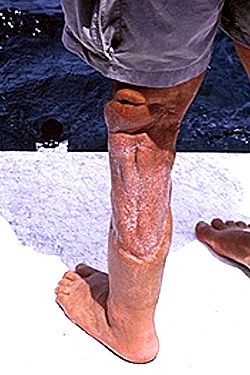
If you can fake it you're made – or possibly dead - says Ted Nield.
Geoscientist 18.6 June 2008
Since 1951, practising spiritualists have had to live by something called the Fraudulent Mediums Act, which at the time of writing (April 2008) is about to be repealed and superseded by new consumer protection law. The 1951 Act was itself intended to safeguard the public against knowingly fraudulent table turners and wall tappers who cynically employed underfloor engines, handkerchiefs on wires and assistants in wardrobes to produce effects that purported to be genuine.
If someone with no belief in the supernatural should ask how a fraudulent differs from a "genuine" medium – then the answer is simply "intention". Proving intention is notoriously difficult, but it is the key to many legal distinctions – as between murder and manslaughter, for instance. For this reason spiritualist "entertainment" does not fall under the 1951 legislation because nobody is being invited to take it seriously.
So what has all this to do with science? Well, believing in the possibility of outlandish ideas is generally held something of a virtue in scientists. It pays off. The Earth is round. Space is curved. Continents move. And we know these things because someone once had the courage to believe the impossible.
But sometimes, I suspect, like speaking to the departed, the impossible really is impossible. Here is a case in point. Ichthyologists are pretty unanimous that "yogic breathing" provides no protection against shark attack. Behavioural ecologist Erich Ritter, a Swiss researcher based in Miami, held a different view. Then, in 2004, an adult bull shark tried to put an end to Mr Ritter's breathing permanently, by taking a chunk out of his leg. (I am happy to say that Mr Ritter has now recovered.)
Dedication to proving sincerely held theories to the point of folly and beyond generally excites public admiration. Nevertheless, as Mr Ritter showed to the satisfaction of all (with the possible exclusion of himself), some things really are impossible and stay that way no matter how much anyone believes otherwise.
Consider now the case of a Yemeni precious stones dealer (known only as "QM") who was hauled before the Dubai Court of Misdemeanour this year for selling onyx pendants that, he said, rendered the wearer bullet-proof. The Court found him guilty and gave him six months, but not before QM begged to demonstrate his pendant by being shot at while wearing one.
We have no reason to doubt the sincerity of this offer, because the Court rejected the plea (not on the grounds that, should he be proved wrong his punishment would have been disproportionate; but because his death would have prevented his enduring six months in a Dubai prison – clearly, a fate worse than death). Yet had an English court done as he asked, and the result that all bar he expected had duly transpired, it should have acquitted QM under the 1951 Act because he would have amply proved that he had believed his sales pitch. He may have made false claims, but he had been sincere.
Despite scientists' openness to wacky ideas, their opponents sometimes perversely paint them as dogmatic and closed minded. Nothing could be further from the truth; but there does come a point where being too open-minded causes your brains to fall out. The experiment with the onyx pendant was, let's face it, not worth performing. Scientists must be open to reasonable doubt; but no fact is safe from the unreasonable doubt that sometimes accompanies unreasoning faith.
As Steve Gould once said about creationism and evolution: "In science, "fact" can only mean "confirmed to such a degree that it would be perverse to withhold provisional assent." I suppose that apples might start to rise tomorrow, but the possibility does not merit equal time in physics classrooms."